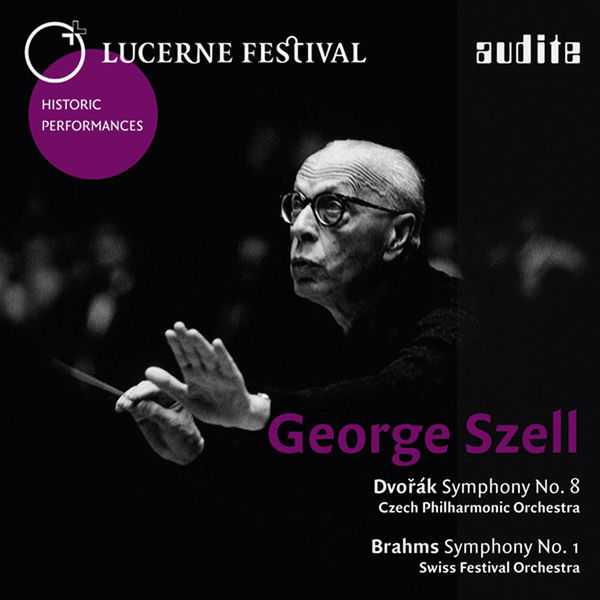
Composer: Johannes Brahms, Antonín Dvořák
Orchestra: Czech Philharmonic Orchestra, Swiss Festival Orchestra
Conductor: George Szell
Format: FLAC (tracks)
Label: Audite
Catalogue: AUDITE95625
Release: 2013
Size: 423 MB
Recovery: +3%
Scan: yes
Dvořák: Symphony No. 8 in G major, Op. 88
01. I. Allegro con brio
02. II. Adagio
03. III. Allegretto grazioso – Molto vivace
04. IV. Allegro ma non troppo
Brahms: Symphony No. 1 in C minor, Op. 68
05. I. Un poco sostenuto – Allegro
06. II. Andante sostenuto
07. III. Un poco allegretto e grazioso
08. IV. Adagio – Più andante – Allegro non troppo ma con brio – Più allegro
Rhythmic precision, formal awareness, absolute faithfulness to the work and razor-sharp orchestral control: George Szell (1897-1970) is seen as one of the great orchestral disciplinarians of the 20th-century, as a superior musical director and an uncompromising perfectionist: a reputation which he gained, first and foremost, during his 24 years as music director of the Cleveland Orchestra, which he formed into one of the world’s finest ensembles. The musical roots of the Hungarian-born conductor, however, are in the ‘Old World’, and after the Second World War he was one of the first musicians in American exile to return to Europe for concerts.
During the ’50s and ’60, George Szell regularly appeared at Lucerne Festival. The concert recordings presented here, both of which are first releases, encompass two works central to his repertoire. In 1962, the ‘anti-romantic and master of precision’ (Harold C. Schonberg), alongside the Swiss Festival Orchestra, achieved a powerful and intensely determined interpretation of Brahms’ First Symphony: the transparently played, chamber-like middle movements are framed by outer movements full of suspense. In the summer of 1969, one year after the violent defeat of the ‘Prague Spring’, Szell was reunited with the Czech Philharmonic in Lucerne. He had worked with the orchestra as early as the 1930s during his tenure at the New German Theatre in Prague. His thrillingly energetic reading of the Eighth Symphony by Antonín Dvorák enthused the audience and critics in equal measure. According to the Neue Zürcher Zeitung: “Szell’s art of expressive tempo modification, preparing, building towards and resolving formal and dynamic tensions was demonstrated to such an extent that the entire symphony, from the beginning, seemed to have been lifted onto a higher level”.
Both recordings demonstrate that Szell’s concert recordings are particularly appealing, thanks to his willingness to take risks, lively musical flow and heightened emotional content: in contrast to his perfectly balanced studio recordings.